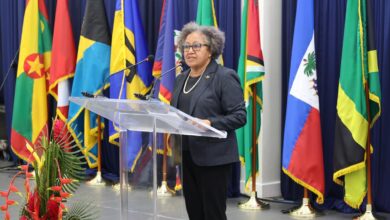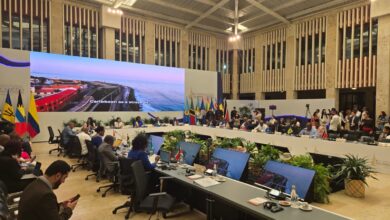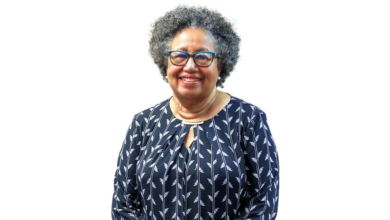Adopted Thursday, 16 October 2025, by the Forty-First Inter-Sessional Meeting of the Conference of Heads of Government of the Caribbean Community
We, the Heads of Government of the Caribbean Community (CARICOM),
Reaffirming that climate change presents a fundamental threat to humanity and planetary habitability,
Gravely concerned that the Caribbean small island and low lying coastal developing states (SIDS), despite our negligible contribution to global greenhouse gas emissions, are disproportionately burdened by its impacts,
Emphasizing still the critical role our Member States play as stewards of rich, unique, and biologically diverse marine and terrestrial ecosystems including our forests and ocean, that are vital to global climate action, and to sustaining the achievement of the 2030 Sustainable Development Goals,
Recalling in this regard, the 2024 Antigua and Barbuda Agenda for Small Island Developing States (ABAS), the 2024 AOSIS Leaders’ Declaration on Sea Level Rise and Statehood and the 2025 AOSIS Leaders’ Declaration on the Special Circumstances of SIDS, and noting the 2025 Lima Declaration adopted at XXIV Meeting of the Forum of Ministers of the Environment of Latin America and the Caribbean, which reconfirm the global recognition of the special circumstances of SIDS,
Underscoring that limiting global warming to below 1.5°C is a scientific and legal imperative to ensure a liveable sustainable future for SIDS,
Further recalling the findings of the Intergovernmental Panel on Climate Change that limiting warming to 1.5°C requires global greenhouse gas emissions to peak before 2025 and be reduced by 43 percent by 2030, and methane to be reduced by one-third by 2030, and acknowledging the essential role of science and indigenous and traditional knowledge in shaping effective, culturally appropriate, and just responses,
Welcoming the landmark advisory opinions of the International Tribunal for the Law of the Sea (ITLOS), the Inter-American Court of Human Rights (IACHR), and the International Court of Justice (ICJ), which clarify States’ obligations on climate change, confirming 1.5°C as the primary legally-binding temperature target,
Deeply disappointed that the nationally determined contributions (NDCs) that have been announced do not align with 1.5°C pathways,
We hereby declare:
- A Renewed Pledge to Paris
- The Caribbean faces intensifying climate impacts with every increment of warming: stronger hurricanes, accelerating sea-level rise, increasing ocean warming, biodiversity loss, and other climate-related disasters that undermine lives, livelihoods, and economies.
- Our peoples stand resilient and resourceful, and we commit to strengthening mitigation and adaptation across sectors, guided by science and indigenous knowledge, and with adequate, predictable and additional international support.
- We also commit to robustly respond to loss and damage associated with climate impacts, while likewise underscoring that international cooperation and support remain fundamental to protect the most vulnerable, especially SIDS.
- We celebrate the tenth anniversary of the Paris Agreement as a call to renewed action, and we look forward to COP30 in Belém as a decisive moment for ambition—raising 2035 targets, fast-tracking the global goal on adaptation, and delivering scaled-up finance, technology and capacity building for mitigation, adaptation, and loss and damage.
- We extend appreciation to Brazil for bringing our islands to the Amazon and offer our support to ensure that the Belém COP is a moment of unity and determination—a point where the world moves from pledges to performance, from ambition to implementation.
- Renewed Global Response for the Critical Decade
- We recall the outcomes of the First Global Stocktake under the Paris Agreement (COP28, 2023), which confirmed that the world is not on track to meet the 1.5°C goal, and that the window for action is rapidly closing.
- We commend all Parties that have submitted their NDCs informed by the guidance from the Stocktake, from science and relevant indigenous knowledge.
- We urge those Parties—especially those with the greatest historic responsibility for greenhouse gas emissions—to realign their 2035 targets with 1.5°C and to immediately ramp up action under their current NDCs, because the time for implementation is now.
- CARICOM remains committed to implementing its 2030 targets and calls for increased finance, appropriate technology, and capacity building to assist in achieving them, setting the path for our 2035 ambition.
- We note the efforts of the International Maritime Organization and the International Civil Aviation Organization toward emission reduction frameworks consistent with 1.5°C and encourage further progress and deeper cuts in these critical sectors while ensuring the necessary support for SIDS to meaningfully and equitably engage with these frameworks.
- We urge that in this decisive decade, we must act with urgency, solidarity, and ambition, guided by science, equity, and the principle of common but differentiated responsibilities and respective capabilities, the special circumstances of SIDS, human rights, intergenerational justice, environmental integrity, and transparency.
- We affirm that the polluter-pays principle is a cornerstone of a just global climate response. We recall the adoption of the New Collective Quantified Goal on Climate Finance (NCQG) at COP29 and look forward to the “Baku to Belém Roadmap ” which should help guide the achievement of a minimum scale of 1.3 trillion dollars annually.
- The NCQG must be met primarily through public, grant-based, and highly concessional finance, with multilateral development banks playing their part, and it must target SIDS as a matter of priority especially because our adaptation and loss and damage needs are the most urgent. We demand equity not debt.
- We express deep concern that the Caribbean region continues to lag in access to finance flows through the financial mechanism that serves the United Nations Framework Convention on Climate Change and the Paris Agreement. This inequity undermines our ability to build resilience, implement our NDCs, and protect our people. We therefore call for enforcement of minimum allocation floors for SIDS, simplified access procedures, direct budget support modalities, and SIDS-dedicated funding windows.
- We welcome progress on the Fund for Responding to Loss and Damage (FRLD), including the operationalization of the Barbados Implementation Modalities, which establish an initial allocation of USD 250 million with at least 50 percent dedicated to SIDS and least developed countries (LDCs). We take note with appreciation of the Board’s efforts to ensure timely disbursements, simplified access, a robust resource mobilization strategy and call for sustained priority for SIDS and LDCs in all future allocations.
- We further urge the Board, in its deliberations, to establish clear performance metrics for early disbursement, adopt guidance on addressing human mobility and displacement, and advance resource mobilisation pathways aligned with the NCQG.
- The year 2025 must mark a turning point when the Fund begins to deliver tangible, equitable support at the scale and speed required, demonstrating that multilateralism can work for the vulnerable.
- We recall that 2025 marks the deadline for the developed countries’ commitment to double adaptation finance. We are concerned for the growing gap between our needs estimated to be USD 14 billion annually compared to mobilized resources from multilateral funds which have reached only USD 800 million to date. We join the resounding call for a renewed commitment to close the adaptation finance gap and reaffirm the call for tripling annual climate finance outflows by 2030, channelled through multilateral climate funds, as a demonstration of progress toward fulfilling the NCQG.
- A Renewed Pledge to Protect the Most Vulnerable
- We welcome the opinion of the International Court of Justice which reinforces that the provision of adequate, predictable, and additional international support for climate action in developing countries is not a matter of charity or aspiration—it is a matter of justice and of legal obligation.
- We support the reform of the international financial architecture to integrate vulnerability through the Multidimensional Vulnerability Index, expand concessionality, and accelerate debt sustainability initiatives consistent with the Bridgetown Initiative and the Antigua and Barbuda Agenda for SIDS.
- CARICOM urges expansion of financial tools appropriate for SIDS, such as debt-for-climate swaps, state-contingent debt instruments, concessional finance with a small-state focus, micro insurance and risk-sharing mechanisms to avoid debt traps.
- We also welcome consideration of other initiatives that could unlock innovative sources of finance while also arresting the climate challenges such as solidarity levies, and redirecting fossil fuel subsidies toward low-emissions, climate-resilient economies.
- We welcome initiatives to leverage our natural assets to mobilize financial resources, including through payments for ecosystem services, blue and green bonds, and credible carbon markets underpinned by transparency, accountability, and environmental integrity. CARICOM requests support for developing a regional carbon market in this regard.
- We underscore the urgent need for enhanced engagement by developed countries in mobilizing substantial, predictable and long-term financial resources for the conservation of tropical forests and for ocean conservation.
- In this context, we welcome the expansion of jurisdictional approaches to forest financing, including carbon markets and the launch of the Tropical Forest Forever Facility (TFFF). Carbon markets and the TFFF are complementary, part of a menu of options for forest financing.
- CARICOM is committed to enhancing our adaptation efforts through national adaptation plans, nature-based solutions, and measures upholding the highest standards of environmental stewardship.
- We call on developed countries to fulfill their obligations to assist SIDS in meeting the costs for adaptation.
- We also endeavour to mobilize innovative finance while safeguarding equity and integrity and to lead globally in advocacy, policy, and diplomacy to highlight the special circumstances of SIDS.
- CARICOM affirms that the concept of a just transition must extend beyond energy systems to encompass all who are most affected by climate change.
- While we fully commit to low-emission development pathways, we need support to ensure climate resilience given our vulnerability. Our people require support for livelihoods, upskilling, cultural preservation, compensation, and dignified relocation as a last resort.
- We are emboldened by the growing jurisprudence confirming binding obligations for mitigation, human rights, protection of the vulnerable, and reparations for climate harm. We accept the recent international advisory opinions as instructive and conclusive.
- We reinforce our demands for justice, compensation, and enforceable global action, with every nation contributing its fair share, leaving no vulnerable nation behind.
- Climate change is an urgent crisis of justice, law, and survival. CARICOM pledges leadership but demands that the world meet its responsibilities.
- We look to the outcomes of COP30 in Belém, Brazil, as a testament that the world will deliver on its commitments to the most vulnerable.






